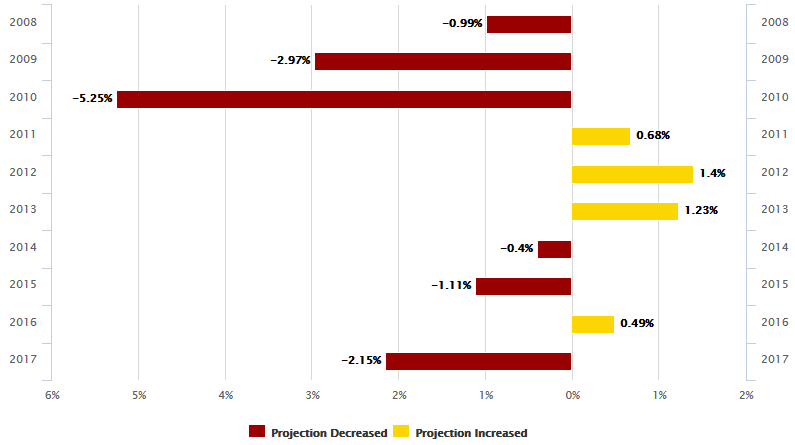ANNAPOLIS (Sept. 21, 2016)—The Maryland Board of Revenue Estimates announced Wednesday that revenues for the current fiscal year are expected to be $365 million less than predicted in March.
This is largely due to the state receiving less individual income tax revenue than the board had predicted.
Board member and State Comptroller Peter Franchot said the numbers reflect a stagnant economy.
"BRE's estimates … indicate that for this calendar year, the average wage in Maryland is projected to increase by only 2.1 percent," Franchot said, "These revenue figures show many Maryland workers are bringing home the same or less pay as their living costs are rising, leaving them with less disposable income to spend."
The board estimated $9.27 billion in individual income taxes and $864 million in corporation taxes in March, the last time it released numbers. On Wednesday, it revised these numbers to $8.96 billion for income and $853 million in corporate tax revenues.
The overall revenue estimate revision is the largest projection error since the 2010 fiscal year, when the state was in the midst of recession recovery and the panel was off by 5.25 percent.
Significant growth in the number of low-wage positions had a large impact on pulling down the numbers, said Andrew M. Schaufele, director of the Bureau of Revenue Estimates.
"We are creating jobs that are highly concentrated in industries that pay below state average," Schaufele said.
Revenue estimates for the current, 2017 fiscal year follow a $253 million shortfall in projections from the previous fiscal year, which ended June 30.
The board's new projections assume 2.7 percent growth in revenues over the last fiscal year, and project 3.4 percent more income for the 2018 fiscal year, which begins in July.
These projections are unrealistic without budgeting money correctly,
said Kali Schumitz, a spokeswoman for
according to the Maryland Center on Economic Policy.
"Unless the state makes investments in things that will grow our economy—like improving our schools, roads, and transit networks—continuing to expect state revenues to grow 3 or 4 percent a year may be too optimistic,"
Schumitz Benjamin Orr, executive director
of the economic policy center, said in a statement.
David Brinkley, Board of Revenue Estimates member and secretary for the Department of Budget and Management, said Gov. Larry Hogan's commitment to fiscal responsibility is prudent, but said spending-mandate relief is necessary in the upcoming General Assembly session.
Hogan spokeswoman Amelia Chasse said these types of budget problems will remain as long as "the Majority Leadership" does not make spending reforms. Democrats control the state Legislature; Hogan is a Republican.
Franchot, a Democrat, said policymakers must exercise restraint in order to avoid imposing additional burdens on Marylanders who are already struggling economically.
"The budgets, spending bills and fiscal policies enacted in this town have a real impact on people's financial well-being," he said.
Md. Board Predicts $365 Million Less in Revenue

This chart compares changes between the Md. Board of Revenue Estimates' annual estimates in March and then in September, from 2008 through 2017. Chart by Daniel Trielli.


